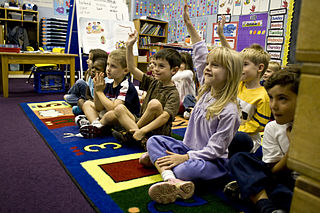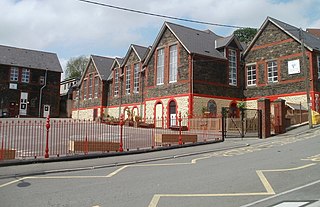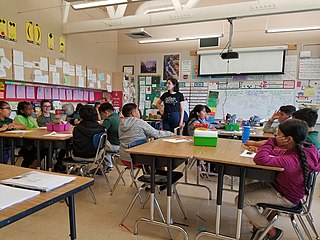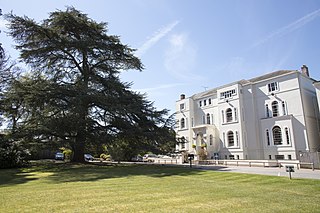Related Research Articles

A primary school, elementary school, or grade school is a school for primary education of children who are 4 to 10 years of age. Primary schooling follows preschool and precedes secondary schooling.

A student is a person enrolled in a school or other educational institution.

Kindergarten is a preschool educational approach based on playing, singing, practical activities such as drawing, and social interaction as part of the transition from home to school. Such institutions were originally made in the late 18th century in Germany, Bavaria and Alsace to serve children whose parents both worked outside home. The term was coined by German pedagogue Friedrich Fröbel, whose approach globally influenced early-years education. Today, the term is used in many countries to describe a variety of educational institutions and learning spaces for children ranging from two to six years of age, based on a variety of teaching methods.

Education in England is overseen by the Department for Education. Local government authorities are responsible for implementing policy for public education and state-funded schools at a local level. State-funded schools may be selective grammar schools or non-selective comprehensive schools. All state schools are subject to assessment and inspection by the government department Ofsted. England also has private schools and home education; legally, parents may choose to educate their children by any suitable means.
Education in Scotland is provided in state schools, private schools and by individuals through homeschooling. Mandatory education in Scotland begins for children in Primary 1 (P1) at primary school and ends in Fourth Year (S4) at secondary school. Overall accountability and control of state–education in Scotland rests with the Scottish Government, and is overseen by its executive agency, Education Scotland, with additional responsibility for nursery schools being the joint responsibility of both Education Scotland and the Care Inspectorate. Scotland's private schools are overseen by the Scottish Council of Independent Schools. Children in Scotland sit mandatory National Standardised Assessments in Primary 1 (P1), Primary 4 (P4), Primary 7 (P7) at the end of primary school, and Third Year (S3) in secondary school, which assist in monitoring children's progress and providing diagnostic data information to support teachers' professional judgement.
This article provides an overview of education in Wales from early childhood to university and adult skills. Largely state-funded and freely accessible at a primary and secondary level, education is compulsory for children in Wales between ages 5-16 years old. It differs to some extent in structure and content to other parts of the United Kingdom, in the later case particularly in relation to the teaching of the Welsh language.
The education system in Northern Ireland differs from elsewhere in the United Kingdom, but is similar to the Republic of Ireland in sharing in the development of the national school system and serving a similar society with a relatively rural population. A child's age on 1 July determines the point of entry into the relevant stage of education in the region, whereas the relevant date in England and Wales is 1 September.

A preschool, also known as nursery school, pre-primary school, play school or creche, is an educational establishment or learning space offering early childhood education to children before they begin compulsory education at primary school. It may be publicly or privately operated, and may be subsidized from public funds. The typical age range for preschool in most countries is from 2 to 6 years.

An infant school is a type of school or school department for young children. Today, it is mainly used in England and Wales. The first two years of school in Ireland are called infant classes.

Fourth grade is the fourth year of formal or compulsory education. It is the fourth year of primary school. Children in fourth grade are usually 9–10 years old.
First grade is the first year of formal or compulsory education. It is the first year of elementary school, and the first school year after kindergarten. Children in first grade are usually 6–7 years old.

A preparatory school in the United Kingdom is a fee-charging private primary school that caters for children up to approximately the age of 13. The term "preparatory school" is used as it prepares the children for the Common Entrance Examination in order to secure a place at an independent secondary school, typically one of the English public schools. They are also preferred by some parents in the hope of getting their child into a state selective grammar school. Most prep schools are inspected by the Independent Schools Inspectorate, which is overseen by Ofsted on behalf of the Department for Education.
Year 12 is an educational year group in schools in many countries including England, Wales, Northern Ireland, Australia and New Zealand. It is sometimes the twelfth year of compulsory education, or alternatively a year of post-compulsory education. It usually incorporates students aged between 16 and 18, depending on the locality. It is also known as "senior year" in parts of Australia, where it is the final year of compulsory education. Year Twelve in England and Wales, and in New Zealand, is the equivalent of Eleventh grade, junior year, or grade 11 in the US and parts of Canada.
Educational stages are subdivisions of formal learning, typically covering early childhood education, primary education, secondary education and tertiary education. The United Nations Educational, Scientific and Cultural Organization (UNESCO) recognizes nine levels of education in its International Standard Classification of Education (ISCED) system. UNESCO's International Bureau of Education maintains a database of country-specific education systems and their stages. Some countries divide levels of study into grades or forms for school children in the same year.
Year 7 is an educational year group in schools in many countries including England, Wales, Australia and New Zealand. It is the seventh full year of compulsory education and is roughly equivalent to grade 6 in the United States and Canada. Children in this year are between 11,12 and or 13.
Year 6 is an educational year group in schools in many countries including the United Kingdom, Australia and New Zealand. It is usually the sixth year of compulsory education and incorporates students aged between ten and eleven. It is generally the same as Fifth grade in the United States, although the birthday cutoff date varies for different countries and schools.
Year 4 is an educational year group in schools in many countries including England, Wales, Australia and New Zealand. It is usually the fourth year of compulsory education and incorporates students aged between eight and nine. It is the equivalent to third grade in America or Canada.
Year 1 is an educational year group in schools in many countries including England, Wales, Australia and New Zealand. It is usually the first year of compulsory education and incorporates students aged between five and seven.
Year 5 is an educational year group in schools in many countries including England, Wales, Australia and New Zealand. It is usually the fifth year of compulsory education and incorporates students aged between nine and eleven.

In March 2020, nurseries, schools, and colleges in the United Kingdom were shut down in response to the COVID-19 pandemic. By 20 March, all schools in the UK had closed for all in-person teaching, except for children of key workers and children considered vulnerable. With children at home, teaching took place online. The emergence of a new variant of COVID-19 in December 2020 led to cancellation of face-to-face teaching across England, Northern Ireland, Scotland, and Wales the following month.
References
- 1 2 "The national curriculum - GOV.UK". www.gov.uk. Retrieved 27 March 2016.
- ↑ "School reception class - From pregnancy to children aged 5". www.foundationyears.org.uk. Retrieved 27 March 2016.
- ↑ "School age". www.kent.gov.uk. Retrieved 27 March 2016.
- ↑ "Starting school - Transitions -". www.educationscotland.gov.uk. Retrieved 27 March 2016.
- ↑ "Can my child defer starting school? | Parent Club". www.parentclub.scot. Retrieved 17 July 2021.